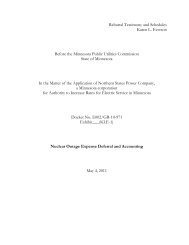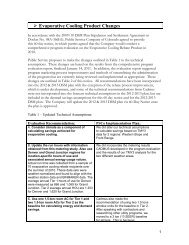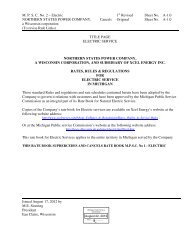Biomass Feasibility Project Final Report - Xcel Energy
Biomass Feasibility Project Final Report - Xcel Energy
Biomass Feasibility Project Final Report - Xcel Energy
You also want an ePaper? Increase the reach of your titles
YUMPU automatically turns print PDFs into web optimized ePapers that Google loves.
power plants burning coal, not fly ash from co-firing applications. And conversely fly ash from<br />
coal can’t be used as a soil amendment. ASTM is considering a change in the standard, but<br />
data on co-fired fly ash is ambiguous. Studies have indicated that some fly ash from some cofiring<br />
facilities meets the standards while that from others does not (Dockter and Eylands, 2003<br />
and Baxter and Koppejan, 2004).<br />
Marketability of fly ash is a serious matter. Losing that revenue stream can be a deal breaker for<br />
some coal plants interested in co-firing. Economic analysis of one experimental co-firing project<br />
found that losing ash sales would have to be offset by switchgrass prices lower than farmers<br />
could deliver it for (Antares Group Incorporated, 2002).<br />
Response to Co-Firing Challenge<br />
Adapting the ASTM standard to allow fly ash from co-firing applications would clarify its<br />
marketability. Expanding the standard to a performance standard would increase flexibility for<br />
using various ash resources. Research could establish a performance standard that plants<br />
interested in co-firing could refer to. Questions whether fly ash from co-firing meets the standard<br />
then would be settled on a facility-by-facility basis.<br />
LEGISLATIVE AND REGULATORY CHALLENGES<br />
Lessons Learned from the <strong>Biomass</strong> Mandate<br />
The state’s original biomass mandate contained several provisions that proved to be impassible<br />
barriers to cost-effective development of biomass power in Minnesota. The two most<br />
problematic were: (1) that biomass power plants be powered by “farm-grown closed-loop<br />
biomass” and (2) that those biomass-powered plants be new ones using biomass for most of<br />
their fuel.<br />
These provisions are largely responsible for the fact that none of the biomass power used to fulfill<br />
the mandate has actually met its original terms (Morris, 2005). By declaring that the mandate<br />
could only be met by biomass-only power plants firing farm-grown closed-loop biomass, the<br />
original legislation dictated the use of the highest cost/highest risk fuel in the highest cost/highest<br />
risk power plants. Years after the original biomass mandate, “farm-grown closed-loop” biomass<br />
sources are still non-existent. Growers find excessive the risk of experimental crops with long lead<br />
times and high costs of establishment – especially when a market for them doesn’t exist.<br />
This history teaches lessons relevant to both policy makers and potential project developers and<br />
investors.<br />
Misguided <strong>Biomass</strong> Mandates<br />
Poorly considered mandates defy commercial or economic solutions. The Department of Public<br />
Service (DPS) captured some of the problem at work between <strong>Xcel</strong> <strong>Energy</strong> and project<br />
developers in their comments on the proposed PPAs of District <strong>Energy</strong> and EPS/Beck. As DPS saw<br />
it, <strong>Xcel</strong> <strong>Energy</strong> was put under pressure to fulfill the mandate quickly with very few options to<br />
choose from. Lacking options, <strong>Xcel</strong> <strong>Energy</strong> was at a disadvantage in bargaining for better<br />
prices. And, in the end, <strong>Xcel</strong> <strong>Energy</strong> had little incentive to bargain anyway because the<br />
mandate let them pass through higher costs to ratepayers.<br />
Page 146<br />
Identifying Effective <strong>Biomass</strong> Strategies:<br />
Quantifying Minnesota’s Resources and Evaluating Future Opportunities

















